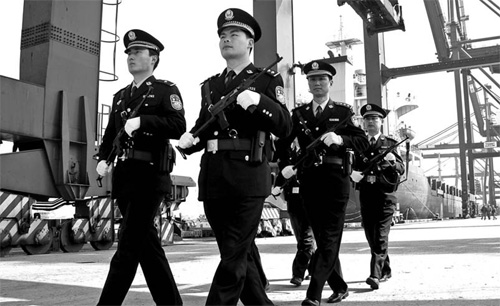Security guards to monitor buses during 2010 Expo
During the World Expo from May 1 to Oct 31, security inspectors will be stationed on all buses for the 42 Expo routes and at thousands of bus stops in a bid to ensure a safe Expo, local police said on Monday.
 |
| Police keep watch around the port of Shanghai during a ceremony to mark the start of armed patrols in Shanghai Wusong Frontier Inspection Station on March 17, 2010. [Xinhua] |
Inspectors will be sent aboard every bus on all the Expo routes for security checks, Cheng Jiulong, deputy director and spokesman of the Shanghai municipal public security bureau, said at a press conference.
Security guards will also be deployed at the 2,188 bus stops and 60 junction stations in the city to check luggage and bags, Cheng said.
Escape windows will be installed on buses on Expo routes and in key areas in case any accidents take place.
Each bus operating on the inner-ring roads will be equipped with closed-circuit video to monitor any irregularities.
Shanghai has the world's most extensive bus system with nearly 1,000 bus lines. The buses have operated well in the past few years, with just a few accidents, terrorist attacks or passenger-induced accidents have been reported.
But for a government that wants the Expo to be "perfectly safe", any potential risk is "intolerable", especially after a string of suicide bombings in Russia earlier this month, which killed at least 51, Cheng said.
Earlier this month, Minister of Public Security Meng Jianzhu called for nationwide coordination to bolster security for the Expo.
"After years of planning and preparation, Shanghai police are confident that the Expo will be one of the most successful in history in terms of security," Cheng said.
Stationing inspectors on buses is only a fraction of the systematic security plan announced by Shanghai police. The plan, divided into 10 categories, ranges from public transportation safety controls to emergency backup plans. Some are already in place and some will be initiated in the coming weeks.
To ensure the Expo's airspace remains safe, small low-flying objects, such as balloons, airships and paragliders, are banned from flying above the city and part of Suzhou and Zhejiang.
Flying kites or Kongming lanterns - small hot-air paper balloons - will also be banned in the vicinity of the Expo Park, to prevent anyone from dropping anything hazardous into the park.
Security in the subway system has already been beefed up. In addition to setting up X-ray scanning points at all of the 870 entrances to the 282 subway stations, explosive-detecting dogs and closed-circuit television cameras will be deployed at subway junctions and stations with dense traffic.
Anyone wishing to buy any kind of knife has to register his real name, a system that has also been applied to the sale of toxic chemicals, including rat poison and pesticides. Real names will also be required at all hotel check-ins.
At the news conference, Cheng dismissed the question of how many police officers will be involved in Expo security, but the media has reported that Shanghai has called on 1 million volunteers - many of them retirees - to patrol streets and detect any security hazards.
(China Daily April 13, 2010)
 0
0 






